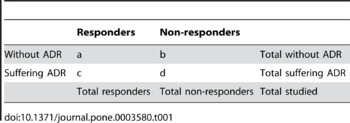Net efficacy adjusted for risk: Difference between revisions
Jump to navigation
Jump to search
imported>Robert Badgett (New page) |
(No difference)
|
Revision as of 13:19, 22 December 2013
In statistics, net efficacy adjusted for risk (NEAR) is a measure that combines measure of efficacy and risk into a single metric.[1][2] For example, the relative risk of efficacy can be combined with the relative risk for drug toxicity into a single NEAR RR. Alternatively, the odds ratio of efficacy can be combined with the odds ratio for drug toxicity into a single NEAR OR.
References
- ↑ Boada JN, Boada C, García-Sáiz M, García M, Fernández E, Gómez E (2008). "Net efficacy adjusted for risk (NEAR): a simple procedure for measuring risk:benefit balance.". PLoS One 3 (10): e3580. DOI:10.1371/journal.pone.0003580. PMID 18974868. PMC PMC2570485. Research Blogging.
- ↑ Boada J, Boada C, Garcia MM, Rodriguez C, Garcia M, Fernandez E (2009). "Net efficacy adjusted for risk: further developments.". Expert Opin Drug Saf 8 (6): 649-54. DOI:10.1517/14740330903241576. PMID 19708816. Research Blogging.


